- Home
- Henrik och Karolina von Mentzers uppsatspris
- 2024: Mikaela Karlsson & Philippe Schneider
- 2023: Cecilia Axelsson & Katharina Trampush
- 2022: Emily Nilsson & Kathina Mehring
- 2021: Jonathan Giedraitis & Kajsa Urge
- 2020: Gustav Sjölund & Kajsa Blomqvist
- 2019: Hilma Lindskog & Sara Ljungberg
- 2018: Elin Nyberg & Kristin Clay
- 2017: Linnéa Johansson & Julia Synnelius
- 2016: Lisa Gastaldi & Clemens Schubert
- 2024: Mikaela Karlsson & Philippe Schneider
- 2023: Cecilia Axelsson & Katharina Trampush
- 2022: Emily Nilsson & Kathina Mehring
- 2021: Jonathan Giedraitis & Kajsa Urge
- 2020: Gustav Sjölund & Kajsa Blomqvist
- 2019: Hilma Lindskog & Sara Ljungberg
- 2018: Elin Nyberg & Kristin Clay
- 2017: Linnéa Johansson & Julia Synnelius
- 2016: Lisa Gastaldi & Clemens Schubert
Henrik och Karolina von Mentzers uppsatspris
Henrik och Karolina von Mentzers uppsatspris instiftades år 2016 och syftar till att uppmuntra och belöna forskning om Europa och europeisk integration.
Priset delas ut varje år till den student som skrivit den bästa kandidatuppsatsen inom Europaprogrammet, och till den student som skrivit den bästa masteruppsatsen inom Master’s Programme in European Studies. De uppsatser som nomineras till priset ska ha ett särskilt fokus på frågor om social exkludering, främlingsfientlighet, diskriminering, demokrati och multikulturalism. Vinnarna tilldelas en prissumma på 2 500 kronor var samt ett diplom.
2024: Mikaela Karlsson & Philippe Schneider

Mikaela Karlsson
Mikaela Karlsson tilldelas priset för uppsatsen Intersektionalitet i EU:s jämställdhetsstrategier: En innehållsanalys av EU:s jämställdhetsstrategier mellan 2010–2025.
Juryns motivering (på engelska):
"The purpose of this bachelor’s thesis is to examine how intersectionality is presented in the EU’s gender equality strategies between the years 2010 and 2025, as well as to contribute to a deeper understanding of the EU’s work on gender equality. The introduction already captures the reader’s interest, leading to a clear purpose and precise research questions. Strong reasoning regarding the selection and clear delimitations allows Mikaela to analyze and present the material effectively, with an analytical framework that gives the study clarity and structure. Mikaela demonstrates a solid command of the method—qualitative text analysis – which she describes in detail and applies systematically. Overall, the thesis is very well-written, structured, and logically organized. It contributes new knowledge and presents a clear, original research contribution in a way that bachelor’s theses rarely achieve."
Philippe Schneider
Philippe Schneider får priset för uppsatsen Championing LGBTI rights while failing women’s rights: Unraveling the Maltese paradox in gender equality policies.
Juryns motivering (på engelska):
"This thesis meets high academic standards while it also tackles a crucial, under-researched issue – the so-called Maltese paradox, where Malta's progressive LGBTI rights sharply contrast with the severely restricted rights of women and girls. Philippe has conducted an exceptional intrinsic explanatory case study, drawing from multiple sources, including in-depth interviews with LGBTI and women’s rights experts and activists. The originality of the work also shines through in the sophisticated theoretical framework, which also contributes to the further theorization of the Southern gender regime. The Church does actively support LGBTI rights while remaining staunchly opposed to women’s rights, which according to the author is rooted in the extensive familialism characteristic of Maltese society. This innovative analysis provides new insights into the complex dynamics of gender equality not only in Malta but also in the whole European Union."
2023: Cecilia Axelsson & Katharina Trampush
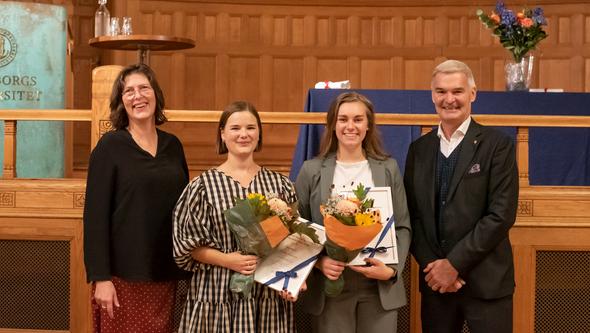
Cecilia Axelsson
Cecilia Axelsson tilldelas 2 500 kronor för sin kandidatuppsats KÄNSLOR SOM ENGAGERAR. En statistisk analys av sambandet mellan affektiv polarisering och valdeltagande i det svenska Europaparlamentsvalet 2019.
Juryns motivering:
"Cecilia Axelsson’s BA thesis departs from the well-known notion that the low voter turnout in European parliament elections is bad for the EU’s democratic legitimacy. At the same time, the rising levels of affective polarization in society, usually associated with less political trust and less respect for democratic decision-making, have been shown to increase voters’ motivation to turnout. Cecilia builds on this research and is the first to test the association between affective polarization and voter turnout in a European Parliament election. The results, based on statistical analyses of the Swedish European Parliament Election Survey, show a positive association between individuals’ degree of affective polarization and propensity to vote, but the association is not stronger among partisan voters. The overall quality of Cecilia’s thesis is very good, in many respects even excellent.
The thesis is very well-written and systematic, and the original research contribution is highly relevant from a societal perspective. Her literature review efficiently synthesizes the different strands of research on affective polarization and voter turnout respectively, from which she derives relevant hypotheses. Cecilia shows awareness in her discussions of the strengths and weaknesses of her method, operationalization, and case. She also brings up the highly relevant and thought-provoking discussion if affective polarization normatively could be seen as something good for voter turnout and whether there is a risk for demobilization among less affective voters in European elections."
Katharina Trampush
Katharina Trampush tilldelas 2 500 kronor i prispengar för sin kandidatuppsats GENDER EQUALITY IN THE EU IN TIMES OF CRISIS: SIDELINED OR SUPPORTED? A qualitative comparative analysis of the EU’s Global Financial Crisis and Covid-19 Crisis policy Response.
Juryns motivering:
"In her thesis, Katharina asks a scholarly and societally very important question – does the EU uphold its values during crises? In the thesis, she analyzes EU’s commitment to gender equality in competition with other policy objectives, such as economic recovery, especially under the conditions of urgency as in the 2008 financial crisis and the Covid-19 crisis. The thesis has a very well-written and extensive overview of the existing research in the field, linking it to clear theoretical discussion of Historical institutionalism. Hence, it becomes clear that the thesis contributes to a well-defined gap in the existing knowledge.
The empirical material covers a large corpus of EU documents from the two time periods, analyzed with a carefully crafted theoretical framework to guide the qualitative content analysis. The analysis concludes by arguing that the in the more recent period, i.e. the Covid19 crisis, the EU support in the form of the NGEU demonstrates greater focus on gender equality than during the previous crisis, which is explained with the help of the theoretical concepts of ‘critical junctures’. In sum, Katharina’s thesis is evidence of her maturity and curiosity, especially with regards to the ability to understand historical patterns and to link high-level theory with empirical evidence. Overall, this is an excellent piece of work and demonstrates a very good understanding of both the substantive issue, but also of research design and academic scholarship."
2022: Emily Nilsson & Kathina Mehring
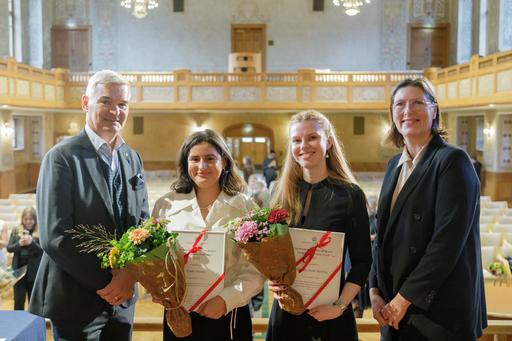
Kandidatuppsats: Emily Nilsson
Uppsatsens titel: WHAT IS THE PROBLEM WITH INTEGRATION? A policy analysis of Swedish policy proposals
Juryns motivering på engelska:
Emily Nilsson's bachelor thesis ‘What is the problem with integration? A policy analysis of Swedish policy proposals’, elegantly uses discourse analysis, drawing on Carol Bacchi's 'what's the problem represented to be-approach' to analyse shifts over time in how the question of 'integration' is represented and understood in Swedish policy documents. This is a methodologically rigorous and theoretically well-situated thesis, which addresses a key case study in European 'integration' in relation to central issues of relevance for the award, namely multiculturalism, social exclusion, xenophobia, and democracy.
Masteruppsats: Kathina Mehring
Uppsatsens titel: ‘PROTECTIVE MASCULINITY’ AND THE POPULIST RADICAL RIGHT. Explaining the gender gap in populist radical right electoral support in Europe?
Juryns motivering på engelska:
Kathina Mehring’s thesis ‘PROTECTIVE MASCULINITY’ and the Populist Radical Right. Explaining the gender gap in populist radical right electoral support in Europe’, is highly relevant to matters of xenophobia, democracy, and multiculturalism in Europe. The thesis provides a comprehensive literature review and a strong theoretical framework, both of which support the empirical analysis. The thesis touches upon issues relevant for the analysis of the current state of democracy in Europe, with a special focus on gendered factors that increase the support for populist right wing parties in European Union. The thesis is of extremally high quality as it combines sophisticated theoretical framing with methodological rigor and a high level of originality, resulting in a delivery of unique and up-to-date empirical findings that fill a significant gap in the knowledge about this phenomenon.
2021: Jonathan Giedraitis & Kajsa Urge
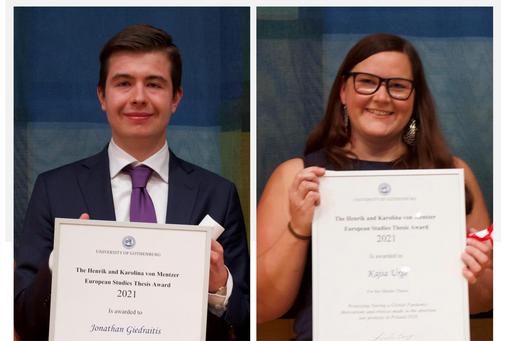
Kandidatuppsats: Jonathan Giedraitis
Uppsatsens titel: Euroscepticism in the Western Balkans: a cause for concern? A micro-level analysis using cross-sectional data of Euroscepticism in the Western Balkan EU candidate countries
Juryns motivering på engelska:
Euroscepticism might hinder the successful integration of candidate countries into the European Union, yet it remains a relatively under-studied topic, in particular when it comes to the Western Balkan region. This ambitious bachelor’s thesis contributes to a research gap by conducting a congruence analysis in which the main theoretical explanations of Euroscepticism are empirically tested and compared. The study identifies political, economic, and identity-bases explanations as the main potential causes of Euroscepticism in the Western Balkans. These explanations are then tested using a new dataset on four candidate countries. The discussion regarding the choice of methods and operationalization demonstrates a level of quantitative analysis skills that is beyond the Bachelor level. Most importantly, the author demonstrates awareness of the limitations of observational analysis and interprets the results carefully and appropriately. To conclude, this thesis provides a roadmap that can help explain not only which factors might lead to Euroscepticism, but also which factors are likely to matter most.
Masteruppsats: Kajsa Urge
Uppsatsens titel: Protesting During a Global Pandemic: Motivations and choices made in the abortion law protests in Poland 2020
Juryns motivering på engelska:
This thesis address an important issues for the analysis of the current state of democracy in Central-Easter Europe, with a special focus on specific aspects of civil mobilisation aimed at combating restrictions of women’s reproductive rights in Poland, one of the greatest indicator of gender inequalities. It is a high quality study, which combines sophisticated theoretical framing with methodological rigor, resulting in a delivery of very original and up-to-date empirical findings. Selected framework is focused around concepts developed within social movements’ studies and sociology of emotions. The methodological considerations are carefully presented, with elaborated reflections on obstacles and limitations. The methodological design is based on a qualitative research approach, based on 15 interviews with protests’ actors. This is a rich material given the scope of the thesis and fieldwork-related challenges caused by the pandemic, a factor that in itself is part of the research question and makes the thesis immensely relevant for contemporary debates within social sciences.
2020: Gustav Sjölund & Kajsa Blomqvist

Kandidatuppsats: Gustav Sjölund
Uppsatsens titel: Europeiska kommissionen: ihärdig eller anpassningsbar? Jämförande textanalys av Kommissionens ställningstaganden angående differentierad integration
Juryns motivering på engelska:
This thesis traces neofunctionalist vs. intergovernmentalist stances in the Commission’s White Books over time, finding that although unified EU legislation should overall promote European integration, the Commission is instead trailing a contemporary development towards differentiated integration. This is explained by intergovernmentalism, pursuant to which sensitivity to participating Member State preferences is (increasingly) prioritized over EU-wide legislative integration.
Sjölund’s findings have important implications. First of all, insofar as it allows differentiated integration, intergovernmentalism as here operationalized risks furthering social or other exclusion/seclusion of certain Member States. Secondly, those opting in will operate without the democratic safeguards built into the ordinary legislative process whereas those opting out of the cooperation will not be able to exercise influence at all. Taking into account the pertinence these political and procedural stakes, as well as its originality, integrity and rigor, it is without hesitation that this thesis should be awarded the Henrik and Karolina von Mentzer award.
Masteruppsats: Kajsa Blomqvist
Uppsatsens titel: From traditionalism and morality to defenders and antagonists of gender equality: The Framing of Gender over time by the Sweden Democrats
Juryns motivering på engelska:
In this thesis, in order to analyze the framing of gender among the radical right parties, the case of the Sweden Democrats is selected as a critical case. The material upon which the thorough investigation has been made includes a comprehensive analysis of official party literature over the past twenty-nine years, since the party’s inauguration in 1989. The author is hereby able to analyze change in party rhetoric over time, which is of interest in view of increasing voter support. The material has been diligently studied with particular reference to the framing of the nature of gender and framing of gender equality.
The author identifies key and relevant framing strategies used by radical right parties such as diagnostic framing (identifying problems), prognostic (providing solutions e.g. through policy) and motivational framing (appeal for electorate support). In so doing, the author contributes to previous scholarship, and to our understanding of ways in which the rhetoric of the radical right has change over time (from the party’s establishment, entering parliament and increasing voter support).The findings are illuminating and placed within the broader trend of radical right parties in Western Europe, where radical right parties have adopted more liberal values to increasing voter support and less focus on returning to traditional values on gender, morality, and sexuality. However, the study also shows how the framing of gender equality is increasingly linked to ethnic nationalism and its anti-immigrant framing and the so called ‘Muslim threat’ and ‘cultural others’. The author hereby explores the illuminating and interesting relationship between the framing of ethnic nationalism (and populism) and gender/equality.
2019: Hilma Lindskog & Sara Ljungberg
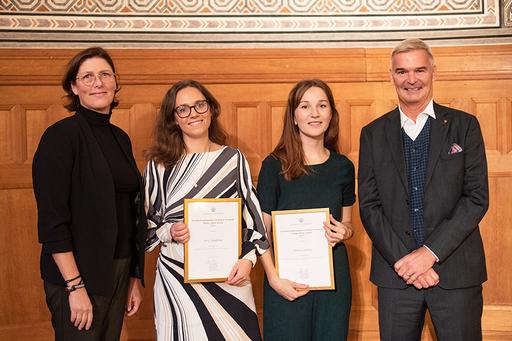
Kandidatuppsats: Hilma Lindskog
Uppsatsens titel: Auktoritära - liberala värderingar: betydelsen av utbildning. En komparativ studie över tid mellan Sverige och Danmark
Juryns motivering på engelska:
"This thesis investigates individuals’ authoritarian-liberal values, comparatively across two periods, in two countries (Sweden and Denmark), that have had partly different development of political aspects of relevance for this value dimension. The author provides a very good overview of theory and previous research, in which she identifies a gap where there are conflicting theoretical expectations regarding the mechanism behind why education is supposed to influence individuals’ attitudes. The thesis thus distinguishes between an individual’s position at work, following education, and the education per se. Five hypotheses are derived from the theory and previous research, and tested empirically in the form of several step-wise, multiple regression analyses, on data from the European Social Survey (ESS). A major plus is the regression diagnostics, which is unusual to find in bachelor theses. The results indicate that education per se seems to have a stronger explanatory power than the work life position. Finally, the thesis has an excellent language, and is very well structured."
Masteruppsats: Sara Ljungberg
Uppsatsens titel: Spitzenkandidaten. A progress for the Democratic Legitimacy of the European Union?
Juryns motivering på engelska:
"The thesis provides an up-to-date and very timely analysis of citizen attitudes towards the system of European parliament party groups nominating so called Spitzenkandidaten for president of the European Commission. The system was introduced by the party groups in advance of the 2014 European parliament elections, but its application to the 2019 elections was uncertain. At this critical point in time, Ljungberg’s thesis bring new knowledge about citizen attitudes towards this democratic invention. This topic is of broad relevance for European studies and in particular, the democratic credentials of the Union and how these are perceived by the EU citizens. The thesis constructs a theoretical framework based on input and output legitimacy in the EU multilevel political system to explain citizen attitudes towards the Spitzenkandidaten system. The theoretical framework is innovative in that it combines both input and output legitimacy with the EU’s multilevel character to build expectations regarding citizen attitudes. The theoretical expectations are then tested using statistical analyses on newly released Eurobarometer survey data. The advanced empirical analyses are rigorously conducted with adequate controls and robustness checks. The thesis shows that citizen’s prior perceptions, particularly about EU legitimacy, are important determinants for their attitudes to the Spitzenkandidaten system. In sum, Ljungberg’s thesis offers new insights into an institutional invention that so far has not attracted much research, which also means that the thesis positions itself at the research frontier and makes a clear contribution."
2018: Elin Nyberg & Kristin Clay
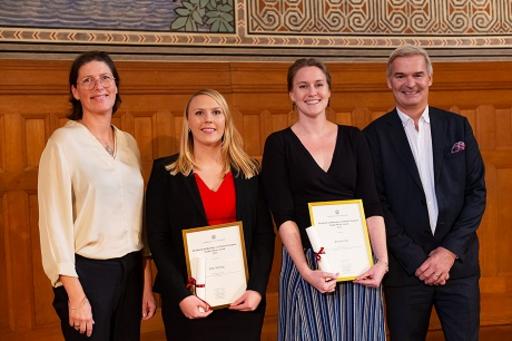
Kandidatuppsats: Elin Nyberg
Uppsatsens titel: Can Information Increase Turnout In The European Parliament Elections? The perks of political conversation for the uninterested
Juryns motivering på engelska:
"Can Information Increase Turnout in the European Parliament Elections? authored by Elin Nyberg speaks directly to the purpose of the award in its emphasis on matters of social exclusion and democracy. The departure point for the thesis is the well-known finding that politically interested individuals turn out to vote in large numbers, but that we have much less understanding about what motivates less politically interested individuals to vote. In a scholarly competent way, Elin clearly positions her study to the existing scientific research, and give a relevant contribution to the literature on the relationship between different types of information and voting participation among politically uninterested citizens. In formulating theory and structuring the analysis, Nyberg capably reviews a large amount of relevant previous research. Elin’s quantitative analysis of 2014 European Election Studies data reports that among individuals with low amounts of political interest, those that were exposed to more information about the EU and European elections in the weeks prior to the 2014 European Parliament elections were more likely to vote. The results further indicated that personal conversations were a particularly important means of information and that this was the case in both the older and newer member states of the EU. Thus Elin finds that information, particularly from friends and family members, does indeed increase the likelihood that a politically uninterested individual votes. In terms of her own analysis, Nyberg identifies potential weaknesses in the data and addresses them in the empirical model. She also tests several different model specifications in order to strengthen the legitimacy of her results. Nyberg’s thesis exposes the variation of premises for voter participation in elections to the European Parliament, and is therefore very relevant to the overarching subject of democracy, which is one of the topics highlighted in the announcement of the thesis award.
Masteruppsats: Kristin Clay
Uppsatsens titel: The grandiosity of tasks and mediocrity of tool”: Confronting the transnational social question with mobile CEE citizens’ experiences in Sweden
Juryns motivering på engelska:
"The grandiosity of tasks and mediocrity of tool: Confronting the transnational social question with mobile CEE citizens’ experiences in Sweden’, authored by Kristin Clay, is a well referenced and unique thesis aiming at a critical analysis of the ‘West’ in largely debated and researched phenomenon of the East-West mobility since the 2004 EU enlargement. The thesis expands the normative analysis of the intra-EU mobility beyond its economic impact. The key focus is on the perspectives of mobile CEE citizens, rather than workers, especially with regard to how these perspectives can expose aspects of othering through the ongoing social and political inequalities within the EU. The thesis challenges a predominant assumption that the freedom of movement is truly universal for all citizens of the EU. Adopting the theoretical lens of coloniality, the author develops an innovative analytical framework in order to assess critically the cornerstones of the EU as a supranational collaborative project, including the norms and the principles surrounding the EU citizenship, the freedom of moment, and the EU’s social dimension. Through the analysis of qualitative interviews with the EU mobile citizens in Sweden, against the backdrop of the selected EU and Swedish official documents, the thesis concludes that the obstacles that the new EU citizens encounter, and the strategies they employ to overcome those, witness about the fact that Sweden as a member state and the EU at large neglect to recognize the transnational aspect of the social question in Europe, and fail to seek solutions on a transnational level. In view of the increasing discord between EU member states, Brexit, and the growth of far-right political sentiments, the thesis compels scholars to acknowledge the historical power asymmetries within Europe and their ongoing effects in order to sustain the future of European integration. In doing so, the thesis speaks right to the heart of the award’s purpose by convincingly presenting highly original, self-reflexive and independent theorization of the frequently overlooked social aspect of European integration.”
2017: Linnéa Johansson & Julia Synnelius
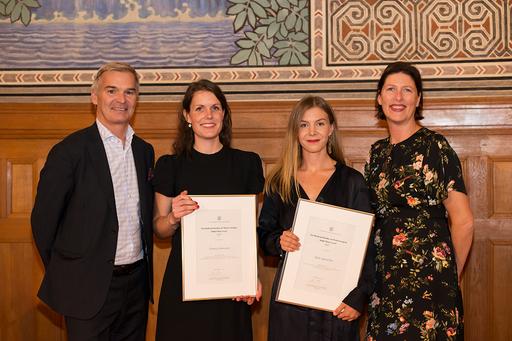
Kandidatuppsats: Linnéa Johansson
Uppsatsens titel: Asylsökande barns rättigheter och barnkonventionen: en jämförande studie av rättighetsdiskursen i Sverige och Danmark
Juryns motivering:
"Linnéa Johanssons studie Asylsökande barns rättigheter och barnkonventionen: en jämförande studie av rättighetsdiskursen i Sverige och Danmark är ett fint exempel på en nyfikenhetsbaserad uppsats som med engagemang parat med anpassning till de vetenskapliga krav som ställs på ett examensarbete på kandidatnivå genomförts på ett helt utmärkt sätt. Författaren skriver distinkt, ändamålsenligt och mycket väl. Uppsatsen är för att vara på kandidatnivå väl förankrad i sin teori och metod, i sitt material och sin analys. Ur betygsprotokollet framgår att studien är väl genomförd i dess olika delar. Den har en bra och mycket tydlig problemformulering som bygger på en iakttagen spänning mellan nationalstaters önskan om att kontrollera invandringen och Barnkonventionens framhållande av rättigheter. En extra dimension tillkommer då flykting- och invandringsdiskussionen tycks handla om solidaritet mellan medlemsländer snarare än solidaritet med flyktingar. Det görs poängfulla och bra motiverade val av länder. Syfte och frågor är väl fungerande. Uppsatsen argumenterar på ett bra sätt för att jämföra de två länderna utifrån likheter i välfärdssystem och skillnader i integrationsnormer och policy. Jämförelsen är konsekvent genomförd. Det är bra att författaren försöker integrera teoriperspektiven diskurs och governance. Här finns en bra redogörelse för befintlig forskning och görs en utmärkt positionering av studien i relation till den tidigare forskningen. Sammanfattningsvis bedömdes uppsatsen med betyget väl godkänd."
Masteruppsats: Julia Synnelius
Uppsatsens titel: Translating gender equality. A case study about the EU gender policy's politicizing capacity
Juryns motivering på engelska:
“Julia Synnelius has authored an excellent thesis with great relevance to both European Studies and the Henrik and Karolina von Mentzer European Studies Thesis Award. While the thesis studies whether a certain EU development program has the potential to politicize gender issues, and thereby contribute to progressive policy developments within these fields, it also contains broader implications for the EU:s gender policies, as well as relevant theoretical discussions. Julia shows that she has a deep understanding of the relevant literature, as well as a good understanding of how to design an inquiry of relevance to her field. She also has a clear grasp of the methodology she uses (interviews), and the thesis includes a transparent and initiated discussion of her results. While no thesis is perfect, Julia also performed excellently during the oral parts of the thesis examination procedure. While she acknowledged some of the limitations of her study, she also gave an excellent motivation for the choice which she had had to make.”
2016: Lisa Gastaldi & Clemens Schubert
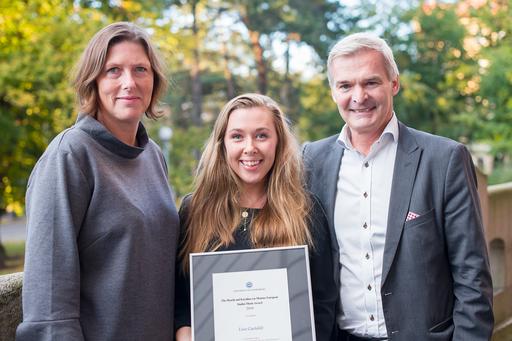
Kandidatuppsats: Lisa Gastaldi
Uppsatsens titel: Protest eller ideologi? Vänsterpopulism och väljarbeteende i Europaparlamentsval
Juryns motivering på engelska:
“The thesis tackles the question of what drives voting for left-wing populist parties in European Parliament elections, arguing that research on populist parties is too focused on right-wing populism. In the wake of the success of parties such as Podemos in Spain and Syriza in Greece this issue is highly salient for understanding the development of European democracies. The thesis convincingly argues that a vote for a left-wing populist party can either be understood as a preference for more left-wing policies, or as a protest against the political establishment. The empirical study is ambitious and well-motivated, and for a bachelor thesis methodologically advanced. The previous research and theory section is comprehensive, and the author develops reasonable hypotheses to be tested. The thesis studies votes for seven left-wing populist in the 2014 EP election, using data from the European Election Survey. Two logistic regression models test the hypotheses of the thesis, and the author controls for other political attitudes and socio-demographic variables as well as including country dummies. The analysis shows that both left-wing ideology and dissatisfaction with the existing government have statistically significant effects. The thesis identifies an important gap in the research literature and shows the ability to use and adapt existing theories to investigate this gap, combined with an excellent empirical study. The author shows an unusually mature methodological awareness for a bachelor thesis. The author also extensively discusses the implications of the study for our understanding of left-wing populism and for European democracies at large.”
Masteruppsats: Clemens Schubert
Uppsatsens titel: Patriotic and Anti-Islam, but European? What European means for Pegida in Dresden
Juryns motivering på engelska:
“Patriotic Europeans Against the Islamisation of the West (German: Patriotische Europäer gegen die Islamisierung des Abendlandes), abbreviated PEGIDA or Pegida, is a nationalist, anti-Islam, far-right political movement. Clemens Schubert’s thesis is an analysis of Pegida as a new, European Social Movement. The thesis analyses the way Pegida constructs European identity, through framing notions of the “European” both as something essentially different than “Islam” as well as being a shared experience of Europeans of all nations to be ruled by European elite of politicians. Combining approaches in the research field of social movements with Laclau and Mouffe’s discourse theory/methodology Schubert makes an innovative discourse analysis of speeches given at Pegida demonstrations in the German city of Dresden. Schubert shows that in PEGIDA discourse, European signifies values, freedoms, norms and principles among which the freedom of expression and sexual rights gain central importance. “European” is thus constituted as a unity to be defended against alleged cultural invasions by Muslim immigrants and multiculturalism. This is also to say that Schubert comes to important conclusions about European identity in an age of growing populism and rising levels of tensions where religion and national belonging are given new meanings. Schubert’s thesis if of high academic quality and displays an impressive grasp on several bodies of scholarly literature. He shows a commendable ability to reflect these literatures critically as he synthesizes them to a coherent framework. His thesis contributes to our knowledge of present day xenophobia as well as to our understanding of democracy and multiculturalism.”